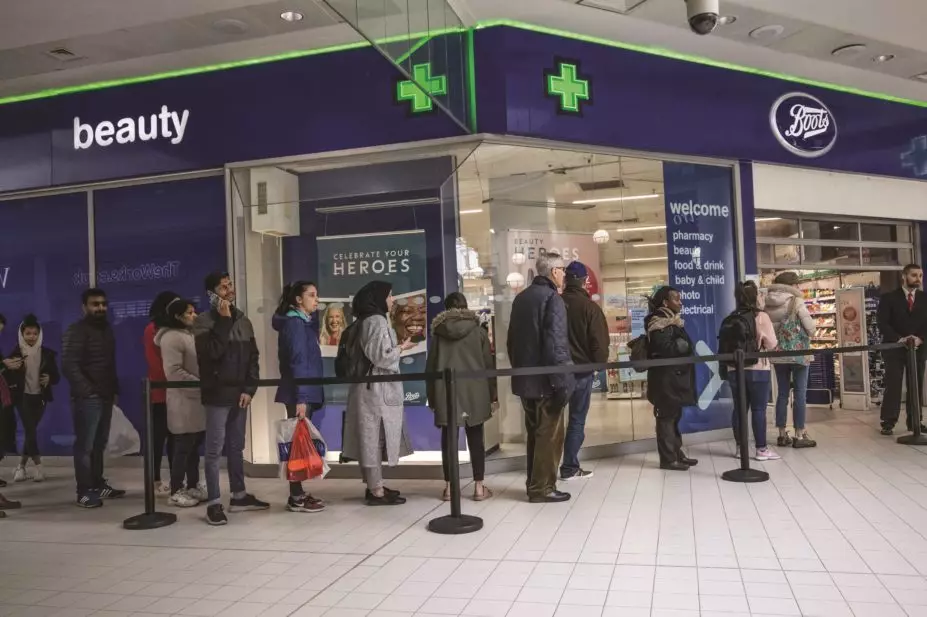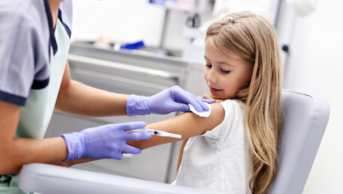
Jeff Gilbert / Alamy Stock Photo
Open access article
The Royal Pharmaceutical Society has made this article free to access in order to help healthcare professionals stay informed about an issue of national importance.
To learn more about coronavirus, please visit: https://www.rpharms.com/resources/pharmacy-guides/wuhan-novel-coronavirus
Pharmacy negotiators have called on Public Health England (PHE) to urgently “re-examine” its advice on personal protective equipment (PPE), because further supplies of gloves, masks and aprons “will be needed” during the COVID-19 pandemic.
Speaking at a press conference on 26 March 2020, Simon Dukes, chief executive of the Pharmaceutical Services Negotiating Committee (PSNC), said more equipment will be needed as pharmacists struggle to follow social distancing guidance from behind dispensing counters.
“What’s concerning me is that the original view was that this PPE was to be used for pharmacists and pharmacy staff when they are dealing with a patient who is showing signs of coronavirus in a confined environment,” he said.
“Actually, now with social distancing … there’s never a huge amount of room behind the dispensing bench and therefore most of these pharmacy staff will have to be wearing PPE to protect themselves from each other in many ways,” he added.
“Therefore, there will be more PPE needed … we need to revisit that advice as a matter of urgency.”
All pharmacies were sent a box of PPE earlier in March 2020, following a letter from Keith Ridge, chief pharmaceutical officer for England, which said that pharmacists would have “limited need” for the protective kit.
Mark Koziol, chair of the Pharmacists’ Defence Association (PDA) echoed the PSNC’s concerns in a letter to health secretary Matt Hancock on 26 March 2020, saying that PHE guidance “does not take account of the reality in many pharmacies today”.
“Dispensaries are often too small to allow for social distancing, especially where extra staff are in place to deal with the massive increase in workload,” he said.
“We urge you to ensure that all pharmacies receive sufficient quantity and quality PPE to protect them from infection and to ensure that PHE revises its guidance to take account of the risks now being faced by pharmacists in reality.”
These comments come after Jill Loader, deputy director of pharmacy commissioning at NHS England and NHS Improvement, told community pharmacists in a webinar on 25 March 2020 that the national body had “provided enough [PPE] that pharmacies should need to use if they are working in line with the standard operating procedure [SOP]”.
However, she said NHS England is “working with stakeholder organisations to try and look at the quantity that’s needed if used in line with SOP to make sure we can provide more supplies if that’s needed”.
“The problem we’re having … is that some people are using it outside of the SOP requirements,” she said.
The SOP, updated by NHS England on 22 March 2020, states that PPE is only needed ”for close patient contact, within two metres”.
”Pharmacy staff are advised to avoid close patient contact at this time, where at all possible,” it states. “There are few occasions where it is expected that staff will be required to wear PPE in the pharmacy setting.”
Concerns about the supply and adequacy of PPE were also raised during a House of Commons health and social care committee hearing, held on 26 March 2020.
At the committee meeting, Chaand Nagpaul, chair of the British Medical Association, suggested that the PPE offered by the UK government was not consistent with recommendations from the World Health Organization (WHO).
“As a minimum a healthcare worker should have their eyes protected, because we know that these droplets can be absorbed through the mucus membrane of the eyes, and also to have a protective gown, and we have neither of those in general practice, in the community nor in [hospital emergency departments],” he said.
Guidance published by the WHO on 19 March 2020 recommends healthcare workers that are providing direct care to COVID-19 patients wear eye protection — either goggles or a face shield — a medical mask, gown and gloves.
Responding to the concerns, Yvonne Doyle, medical director at PHE, said that the “vast majority” of the guidance was consistent with WHO recommendations, but agreed that there was “a problem about everyone agreeing what the right thing to do is”.
Doyle confirmed that the guidance for PPE was being kept under “active review”.

